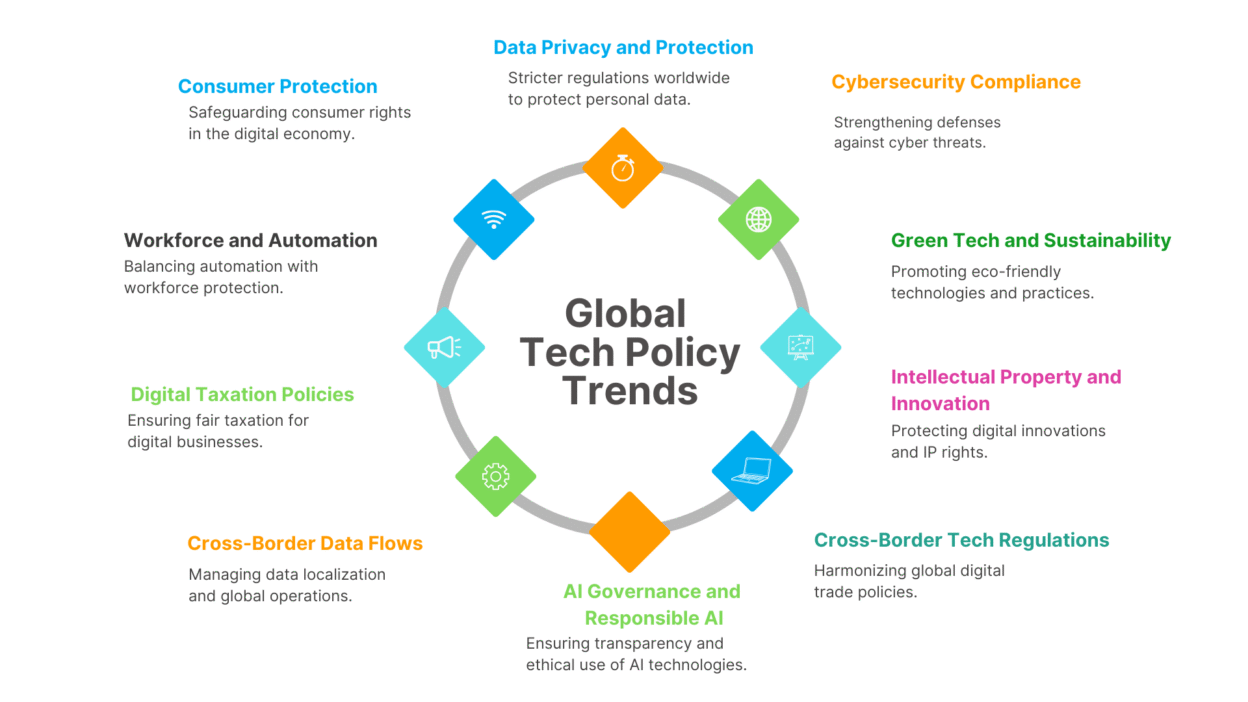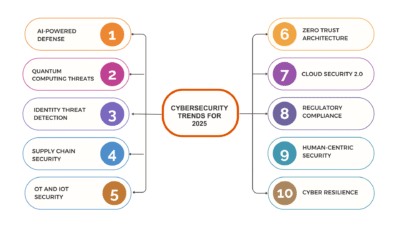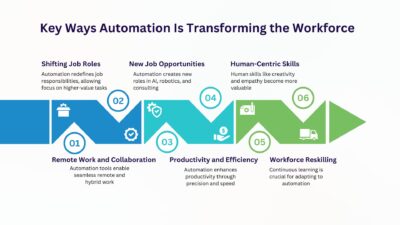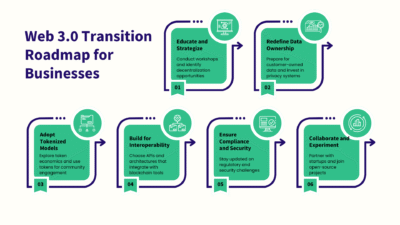Technology doesn’t just evolve—it reshapes the rules of business, society, and even government oversight. As innovation accelerates, global policymakers are introducing new regulations, standards, and frameworks to ensure technology is safe, ethical, and sustainable.
For businesses, these policies are more than headlines. They directly impact how companies operate, scale, and compete in a global economy. Whether you’re a startup founder, a multinational executive, or a CTO, understanding these trends is no longer optional—it’s a necessity for survival and growth.
Let’s dive into the global tech policy trends in 2025 that will shape the way businesses build, deploy, and manage technology.
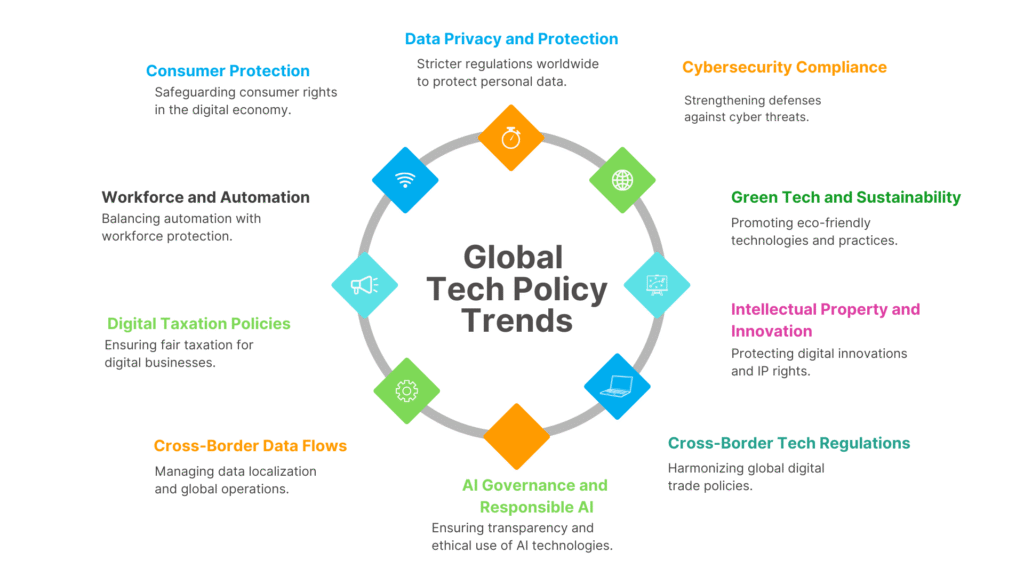
1. Data Privacy and Protection Laws
Stricter Regulations Worldwide
With data breaches and misuse still making news, governments are strengthening data privacy laws. The GDPR in Europe set the standard, but now countries in Asia, Africa, and the Middle East are introducing their own frameworks.
What This Means for Businesses
- Businesses must comply with regional privacy laws, even if they operate globally.
- Data governance and ethical handling of customer data are becoming competitive differentiators.
- Non-compliance can result in hefty fines and reputational damage.
2. AI Governance and Responsible AI
Rise of AI Regulations
AI is no longer experimental—it’s powering healthcare, finance, hiring, and even government decision-making. This has led to global conversations about responsible AI. The EU AI Act and similar initiatives in the U.S. and Asia are setting benchmarks.
Business Implications
- Companies must ensure transparency and explainability in their AI systems.
- AI models must avoid bias, protect user rights, and be auditable.
- Ethical AI certifications may soon become mandatory for enterprises.
3. Cybersecurity Compliance
Cyber Threats on the Rise
As businesses digitize, cyberattacks are becoming more sophisticated. Global policy responses include stricter cybersecurity frameworks, mandatory incident reporting, and international cooperation.
Business Impact
- Businesses must invest in AI-powered cybersecurity defenses.
- Sectors like finance, healthcare, and government face additional compliance layers.
- Companies failing to secure systems risk not only attacks but also legal consequences.
4. Cross-Border Data Flows
Policy Shifts in Data Localization
Countries like India, China, and Brazil are pushing for data localization laws—requiring that data generated locally must be stored locally. While this improves security, it complicates global operations.
Implications for Businesses
- Multinationals must rethink cloud infrastructure strategies.
- Compliance requires partnerships with local data centers and cloud providers.
- Global SaaS businesses may face higher costs and infrastructure challenges.
5. Green Tech and Sustainability Policies
Climate-First Regulations
Governments worldwide are making sustainability a policy priority. From carbon taxes to renewable energy mandates, industries are under pressure to align with green goals.
Impact on Business
- Companies must adopt clean technologies in operations and supply chains.
- Sustainability reporting is becoming mandatory, not optional.
- Green innovation is no longer a cost—it’s a path to competitive advantage.
6. Digital Taxation Policies
Global Push for Fair Taxation
The rise of digital businesses has forced governments to rethink taxation. Policies like the OECD’s global minimum tax ensure tech giants pay fair shares, regardless of location.
What Businesses Need to Know
- Digital-first companies face new compliance requirements across jurisdictions.
- Startups expanding globally must navigate multiple tax frameworks.
- Transparent reporting and smart tax planning are essential for growth.
7. Intellectual Property (IP) and Digital Innovation
Policies Catching Up with Tech
From NFTs to AI-generated art, global regulators are updating intellectual property laws to address new challenges. Protecting innovation in the digital age is now a top policy concern.
Business Impact
- Companies must rethink IP strategies for AI-driven creations.
- Stronger enforcement protects businesses from piracy and counterfeits.
- Innovators gain more leverage in global markets with updated IP frameworks.
8. Workforce and Automation Policies
Protecting Jobs in the Age of AI
Governments are stepping in to balance automation with workforce protection. Policies around reskilling, upskilling, and fair wages are emerging globally.
For Businesses
9. Cross-Border Tech Regulations
- Companies automating processes must also invest in employee reskilling.
- Expect stricter labor policies around AI-driven hiring and workplace surveillance.
- Businesses that balance automation with human value gain long-term trust.
Standardizing Global Digital Trade
International organizations are working to harmonize global digital policies, from cybersecurity norms to digital trade standards. While adoption is uneven, the trend is toward global cooperation.
Implications
- Businesses gain simpler trade frameworks when standards align.
- Compliance costs may drop as regulations become more consistent worldwide.
- Early adopters of global compliance frameworks will gain trust with partners.
10. Consumer Protection in the Digital Economy
Policies to Protect the End-User
From fake reviews to hidden fees, governments are cracking down on unfair digital business practices. Policies now focus on transparency, ethical advertising, and digital consumer rights.
What Businesses Must Do
- Build trust-first digital strategies.
- Offer transparent pricing, clear data use policies, and unbiased algorithms.
- Businesses prioritizing consumer protection will build loyalty and brand equity.
The Convergence of Tech and Policy
What makes 2025 unique is that tech policies are no longer afterthoughts—they’re shaping business models themselves. For example:
- An AI startup must integrate responsible AI practices from day one.
- A global SaaS provider must design infrastructure that adapts to localization laws.
- A green energy firm must report its carbon impact as part of compliance.
Challenges for Businesses
While these policies aim to protect consumers and societies, businesses face challenges:
- Compliance Costs: Smaller companies may struggle with complex requirements.
- Fragmented Regulations: Different countries set different rules, complicating global strategies.
- Innovation Slowdowns: Over-regulation may stifle experimentation in startups.
How Businesses Can Prepare
- Stay Informed: Regularly monitor global policy changes in your industry.
- Build Compliance into Strategy: Treat compliance as an innovation driver, not a burden.
- Collaborate with Experts: Engage legal, policy, and tech advisors early in product design.
- Invest in Ethical Tech: Prioritize transparency, sustainability, and consumer trust.
- Be Proactive, Not Reactive: Anticipating trends puts your business ahead of competitors who wait for regulation to hit.
Final Thoughts
Global tech policy trends in 2025 are reshaping industries just as much as technology itself. From AI governance and cybersecurity compliance to green tech mandates and digital taxation, businesses must adapt quickly—or risk being left behind.
The winners will be the companies that treat policies not as roadblocks, but as opportunities to innovate responsibly, build trust, and lead in a rapidly changing digital economy.

